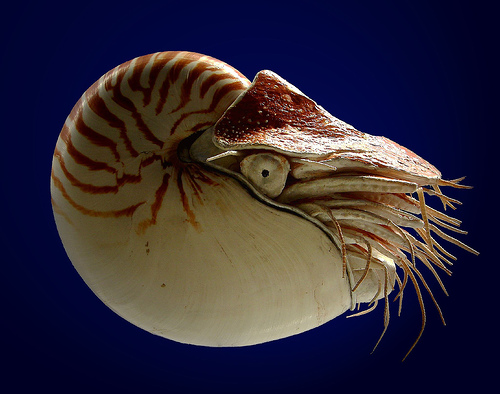I'll start by giving a definition of a nautilus based on research I completed long ago. Essentially, a nautilus is like an octopus only the core of it body is covered in a protective, spiral, shell. From this body armor emerges the eyes and mass of tentacles giving this animal its resemblance to spaghetti protruding from a dough of bread (it's the only analogy I could come up with). Obviously, the nautilus is a sea creature like most tentacled entities. Also, the shells themselves are highly collectable and are still being used in decoration. You can probably see the individual sections that compose the shell interior creating the unique fractal effect. This occurs with the progression of the nautilus' life, as it grows larger, it adds more area/living space for itself ("how?" you ask. I'm not quite sure).
 There are other important biological and historical allusions present in "The Paper Nautilus." I find the Parthenon to be a unique reference, especially because of its ironic background. Originally, the Parthenon was a glorious structure, practically a three-dimensional mosaic filled with intricate carvings that were not often seen around the time it was first built. The irony here is that it was entirely aesthetic, it served no political or economic purpose. However, when the Turks invaded Greece they found it was perfect for ammunition storage...of gunpowder (the enemy of the Greeks made their buildings work)! So of course a stray spark from enemy bombardment would blow it up in 1687. Otherwise, the references to the Hydra, Hercules, and even classical Greece are generally known by more people in comparison with the Parthenon, I'm not going to elaborate on those (the book does a decent job).
There are other important biological and historical allusions present in "The Paper Nautilus." I find the Parthenon to be a unique reference, especially because of its ironic background. Originally, the Parthenon was a glorious structure, practically a three-dimensional mosaic filled with intricate carvings that were not often seen around the time it was first built. The irony here is that it was entirely aesthetic, it served no political or economic purpose. However, when the Turks invaded Greece they found it was perfect for ammunition storage...of gunpowder (the enemy of the Greeks made their buildings work)! So of course a stray spark from enemy bombardment would blow it up in 1687. Otherwise, the references to the Hydra, Hercules, and even classical Greece are generally known by more people in comparison with the Parthenon, I'm not going to elaborate on those (the book does a decent job).Now to tackle the theme. By writing this piece, the author meant to communicate to the reader the concept that many "old-style" writers/poets continue their work mainly out of the want for publicity and or monetary reward. Meanwhile, the nautilus nurtures unhatched infants who will become the new, the brilliant writers of the next generation. These "new" writers will be pure (the many references to the color white) and strive to uphold the modern day versions of Greek ideals, holding to the importance of physical and mental health (Greek references). Thus, they will venture forth from their nautilus mother, not subject to the "wasp-nest flaws" of their predecessors. Again, my group covered this in class but this is CONCRETE PROOF of our information.
Ultimately, no I did not enjoy this poem even if my lengthy description makes it seem as such. There are so many other more simple ways to convey the same thought the idea tried to express (assuming this interpretation is even remotely correct). And yes, I do believe there is a "correct" interpretation but only the author can really give us an accurate insight.

I love the images accompanying your post, Jeremy. They really make your analysis pop! I did not know that about the Parthenon. It's a fascinating story. Do you think Moore knew that story? Based on her poem?
ReplyDeleteThank you, I finally got the nerve to try some image posting. But no, Moore probably did not try to use the Parthenon as an ironic metaphor, still, it is interesting to note.
ReplyDelete